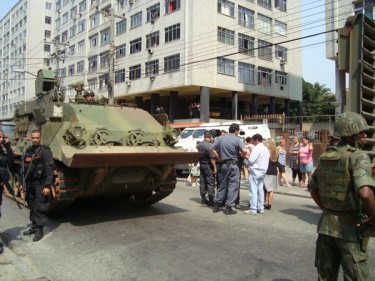A wave of violence has frightened residents of the city of Rio de Janeiro. Beyond arrastões (a form of mass robbery), car burnings, bombs, shoot-outs, criminals have also attacked police posts. The violent attacks bring back the old discussion about security in the city. A great wave of panic, in part brought on by the mainstream media, also brings to the fore a new problem: the great proliferation of false rumors on the Internet. The blogosphere and Twittersphere have begun to question the reason behind the attacks – as well as the veracity of the facts – and are demanding evidence.
See below a map of the attacks that is being constantly updated:
Visualizar View the violence in Rio and the reactions of the police in a larger map.
The map shows that the attacks are occurring all over the city and are moving and decreasing in accordance with intense police operations. A large assault was announced for Saturday, which resulted in the acceleration of operations, principally in the favelas of Vila Cruzeiro and Complexo do Alemão.
At 9pm local time on November 25, seven of the ten trending topics in Brazil on Twitter were related to the situation in Rio de Janeiro, from highest to lowest:
#BOPE [Special Police Operations Battalion]
#Vila Cruzeiro [area invaded by drug traffickers fleeing police operations]
#Pimentel [Captain Rodrigo Pimentel, police and co-author of the film Tropa de Elite]
#Cabral [Governor of the state of Rio de Janeiro]
On the world trending topics at the same time, #BOPE was in third place, followed by #Vila Cruzeiro and #Pimentel.
Opinions on what exactly was happening in Rio de Janeiro diverged:
mitsudiz Enquanto isso a Tijuca caga pro pânico midiático. A galera aqui é treinada desde 2001 a diferenciar psicopatia coletiva de guerra civil.
jasomcox Agora surgem boatos que tem arrastão e tiroteiro em cada canto do RJ, ó ta rolando um aqui no play do meu predio
@danielefranco: É mto bom ver os amigos tuitando dizendo que chegaram bem em casa! #Alivio
@LiraBellaquaa violência tá mais do que presente. Passei o dia todo ouvindo sirenes. Isso é a realidade
@celsoathayde amanha nova guerra anunciada no complexo. a Policia vai lá fazer o seu trabalho, o crime vai contra atacar e moradores vão morrer #ilógico

"Tanque de Guerra aqui perto de casa #MEDO" ("War tank here close to home #FEAR") by Twitpic user BrunoFq
The need to know what is true or false, and which areas were or were not being attacked, made @casodepolicia launch two hashtags #everdade (#truth) and #eboato (#rumor), through which information revealed on the web was verified in real time. The tweet reached 10,000 followers on the fifth day of the terror in the city.
Coverage led by the country's major broadcasters was criticized via Twitter. According to the blog of the Knight Center [pt], the account of BOPE slammed coverage of some for getting in the way of operations [BOPE's were subsequently deleted]:
Usuários usaram o hashtag #globocop para comentar a cobertura das emissoras no site de microblogs. “A #Globo fica dedurando o esquema tático do Bope!”, reclamou uma internauta. “Se o #globocop não estivesse ali o helicóptero do Bope ia chegar fazendo tiro ao alvo”, comentou outro.
Among the possible reasons for the recent increase in attacks is the idea of reprisal for the installation of UPPs (Pacifying Police Units). These UPPs were first installed almost two years ago in the effort to remove drug traffickers from the favelas and “bring peace” to residents through the installation of a police unit at strategic points in the slums. Part of the population indeed believes that the UPPs are helping to control the problem, and others ask themselves if it would be this easy to “expel the criminals”. The number one question would be, where did these criminals go after being expelled by the installation of the UPPs? Siron Nascimento, cited by the blog Vi O Mundo (I Saw the World) [pt] responds:
O governo do Estado ocupou algumas poucas favelas, com resultados positivos em algumas, anunciou sua política pacificadora e dormiu em seus louros. Ora, os bandidos abandonaram as favelas das UPPs e foram para onde? Alguns para a Baixada Fluminense e Baixada Gonçalina. Outros deslocaram suas atividades do tráfico para crimes de outro tipo. Assaltos, invasões de edifícios, arrastões como os que vemos agora.
On the same blog [pt] the comment of a reader on the same topic of the UPPs followed:
É preciso perguntar: UPP dá certo? Só isso basta? Sem inteligência se combate o crime, prende bandido e retira suas armas? É necessário fazer um raio-x da política de segurança pública do Cabral [Governador do Estado do Rio de Janeiro]. A UPP não é ocupação social. É ocupação militar. Não tem nenhum civil desempenhando qualquer função nas upps. Ia ter um concurso para assistente social, psicólogo, advogado etc para as UPPs e foi cancelado. E os bandidos, para onde foram? E suas armas?
There are those who disagree with the argument that the attacks have been a response to the UPPs, such as Gustavo Barreto of Consciência (Conscience) [pt]:
Os principais chefes da Polícia Militar do Rio de Janeiro e a Secretaria de Segurança Pública vendem a tese deplorável de que os atentados são uma ‘reação às políticas das UPPs’, e a velha mídia simplesmente engole. O curioso é que as UPPs estão presentes em 13 favelas, de um universo de 1.000 existentes no Rio e região metropolitana. Imagina quando chegarem a 20, 30! Melhor mudar para Miami de uma vez.
The most interesting aspect of all is that a good portion of the violence reported after this series of attacks was already common before. The sounds of shooting are not exactly anything new in Rio de Janeiro. What is different this time, however, is that everything is happening at the same time, and everything is being spoken of, reported and investigated as part of the same giant problem. The population of the city is being tempted to speak out and be heard (whether through the Disque Denúncia [hotline] or whether on Twitter), and being taken seriously by the authorities. When a person reports via tweet, sees their report being investigated, and hears of police action, this not only stimulates the participation of residents but also gives credibility to the police. Everybody wins.
@MatheusXLima Muito legal a policia estar agindo contra o trafico no #RiodeJaneiro
@cibele2011 Eu amo o Rio de Janeiro. É surreal o q [sic] aparece na mídia, mas finalmente tá acontecendo o q deveria,a polícia agindo como polícia.
What residents actually want is that police forces are able to stop this series of attacks and that this helps to solve the city's problems with violence. It is also hoped this wave of violence helps to re-evaluate the actions of the government, resulting in a real strategy for “pacifying” the city. The problems should be resolved so that residents can stop living in fear and not so that large events like the World Cup 2014 and Olympics 2016, always cited by international media in relation to Rio, can be held safely. It is time to think of the local and not the global.
@andersonaragao1 Engraçado… o RJ se acabando na violencia e a preocupação mais aparente do governo e da imprensa é com a imagem da sede da copa…
@ALB_Whiite como que o brasil quer sediar copa do mundo se não dá conta nem da violencia q ocorre no rio?alguêm me explica isso???
@NOGALMEIDA N sei como o Brasil quer sediar a copa com tanta violência!Os jornais apenas revelam o que nossos queridos governantes tetam esconder!:)

Statue of Christ the Redemptor, important tourist spot in the city, with a worried appearance – image by @tcherol via Twitpic
The author of this post is from Rio de Janeiro.







8 comments
A situação está tomando proporções gigantescas, temo pelo que está para acontecer!
Would you advise foreign visitors to come to Rio this week?
I an American and was planning to visit Rio with a group of 50 friends next week?
We would be staying on a ship in the Avenida Rodrigues Alves Pier Maua Terminal and visiting the tourist areas of Ipanema and Copacabana beaches. The map should violence in all of those areas. What do you natives think? We love Rio, but is it safe for foreign tourists to visit and wantder around not knowing language or the areas we are visting? We would appreciate your advice. Thanks!
We are not in the business of giving travel advice. However, one comment. If you zoom in on that map, there are very few incidents listed in Copacabana and Ipanema. One was a false alarm. The others were isolated car burnings. Very few violent incidents are reported on that map in the areas you will visit. Generally aimless wandering is not advised, just as it would not be in a major US city, no matter the circumstance.
Thanks Janet.
I was asking — would natives advise foreign tourists to postpone trips to Rio until the situation stabilizes.
Also — is the media exaggerating the violence? Or is this pretty scary random terrorism with lots of people killed and robbed? WHen we read about car and bus burnings, what happened to the people in the cars and buses? Were they robbed or injured? Killed?
It is hard to judge the situation from afar with only brief media reports.
Thanks again for any advice.